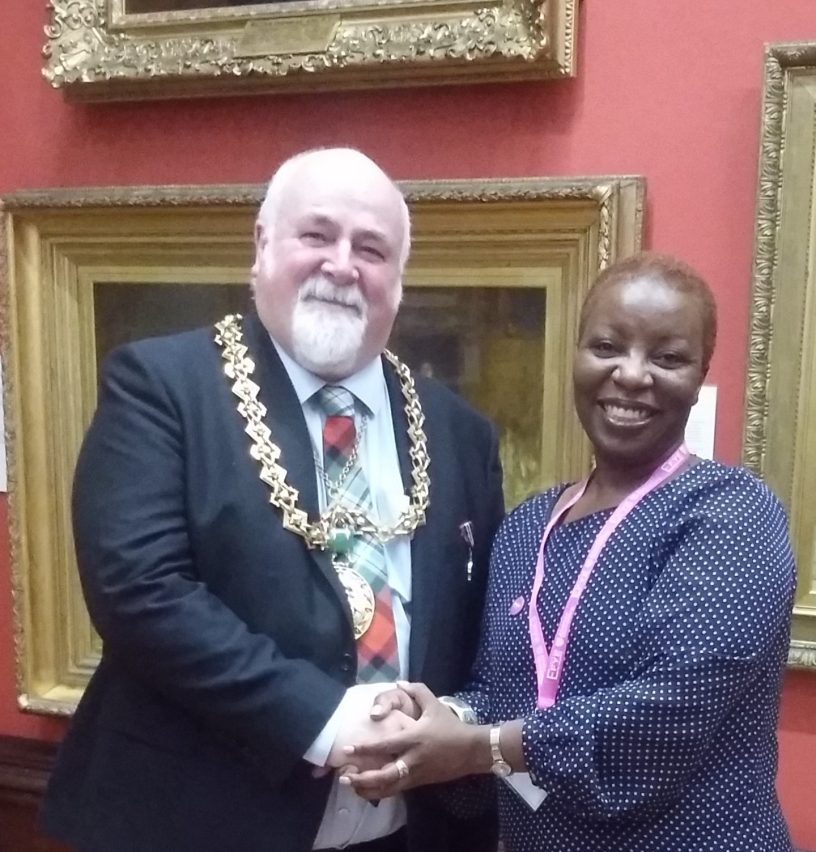“Bridging the gap for non-traditional first-year students in a distance education setting”. That was the title of the presentation given by Dr André Biederbeck and Dr Prue Goredema at the 17th annual European First Year Experience (EFYE) Conference which was held at Abertay University in Dundee, Scotland from 27 – 29 June 2023. Almost 340 delegates from 24 countries attended the top-billed conference this year, where the themes were centred on discovery and design to foster academic and social success for students embarking on their first year of the higher ed journey.
“The American system with its four-year degrees affords students the opportunity to explore various subjects in the famed 101 courses before settling on a major,” explained Diane Nutt, the conference founder, in a workshop held on the first day of the conference. “The European system is not designed with that level of exploration in mind, so it was important for us to look more intensively at how we might instigate measures that make for a successful first year experience,” she elaborated as she talked about the founding of the EFYE network back in 2006.
The current EFYE network chairman William Carey was also on hand to explain to newbies the role that the international group plays in bringing administrators, academics and student groups together to iron out issues of concern, exchange ideas and impart information on the myriad aspects that go into helping students transition smoothly into the mindset necessary to pursue a degree. In most cases this pertains to students in their late teens, but with diversification of student bodies and institutions, first year students are also middle-aged adults who never got around to going for that degree or full-time workers who want to pursue a master’s degree on the side. Non-traditional students come in all guises, and we at the Centre for Learning and Innovation’s studyFIT unit spend much time devising support measures for students from all walks of life.
Addressing a room of attentive participants, Dr Biederbeck presented some key findings on the effectiveness of the interventions held for law students by studyFIT’s Dr Christine Gelinski who was herself unable to make the trip. Both synchronous and asynchronous formats are used to cultivate hard-core know-how that makes all the difference in the assessments first year students take in Civil Law and a further foundation course. Dr Biederbeck also touched on the support measures offered by the studyFIT Writing Centre, specifically the peer-to-peer programme which has been well-received by users.
Dr Prue Goredema presented some preliminary results from the ongoing longitudinal study into the efficacy of the Altissia language learning platform whereby over 1720 students and counting are on board. She then demonstrated some highlights from an instructional unit of the newly released course “English Learning Support: Humanities and Social Sciences”, which impressed the attendees. “When we encourage students to avail themselves of the services offered by studyFIT we are not bloviating bombastically,” said Dr Goredema. “We systematically evaluate our services in a number of ways – direct student feedback; data showing improved test scores in the majority of students who participate diligently in our workshops; promising learning analytics from those who take their language learning seriously; and also feedback from faculty members,” she added.
The three-day adventure at Abertay University was action-packed, and the only daytime hardship was deciding which of the parallel sessions to attend since so many were of direct relevance to our own interests despite our rare set up as an exclusively distance learning institution. Whilst campus universities have an easier time of getting to know the individuals they serve, some of the structures are nevertheless similar in conceptualisation, such that garnering ideas from others is a cinch. For example, we were pleased to engage with Eadaoin Regan and Kathy Bradley who head up the Skills Centre at University College Cork, Ireland, only to watch in amazement when the latter was later awarded the first ever EFYE Leader/Champion Award at the conference closing session.
Getting to know the movers and shakers in student services at Europe’s prominent universities is also a boon for those of us eager to foster cross-border collaboration at a time when internationalisation is amongst our many mandates. The hosts, Abertay University, went all out to ensure that the sessions ran smoothly and that delegates were able to navigate the labyrinth that constituted the venue (a big, brick, very British building). A special treat they had in store for their hundreds of visitors was a civic reception at the city-centre McManus Galleries where, surrounded by colourful collections of both classic and contemporary artworks, we were welcomed to town by the Lord Provost, Bill Campbell.
“At first I thought he was a stand-up comedian,” Dr Biederbeck admitted later, laughing at the misconstrual. “He had the room in stitches during his welcome speech, and the light-hearted touch was a departure from what German town mayors might go for on such an occasion.”
“The Lord Provost was indeed a barrel of laughs,” Dr Goredema concurred. “Even our later one-on-one chat was both congenial and delightful, as he convinced me to come back to explore the Dundee and Angus region in south east Scotland.”
The city is perched on a bay that runs into the North Sea, and the surrounding countryside largely consists of undulating green hills, Christmas tree farms and more castles than you can shake a stick at. Plus, you could be walking along the pier at supper time and hear a random bagpiper warming up in the car park. Nice.
It might have been the company we kept, but we sadly did not get to hear much in the way of an authentic Scottish brogue and at no point did we espy a single man in a kilt. But at least they had plenty of shortbread on sale, so one must be grateful for small favours.
There are only two things that might make one reconsider returning to otherwise bonnie Dundee. First up: the dreary weather – It seems the Scottish sun had not received the memo that it was mid-summer and no time for anyone to be running around town in shawls and jackets. Finally, a most bizarre incident occurred on our final night at the Firth of Tay. So bizarre it deserves two full paragraphs.
The twilight zone (albeit at 3 a.m.)
“This is a fire alarm. Please go immediately to the nearest exit.” The canned voice repeated the directive, and an ominous red light beamed around the room, emanating from the smoke detector. Slipping into my shoes and managing to wrest on a jacket to slap a modicum of decency over my nightie, I grabbed my key card and bounded out of there. Down four flights of stairs, I raced out the building and into the inky black night. I was the first of three people to huddle in amazement at the gathering point across the street. Over the next couple of minutes, more hotel guests trundled out, most in their jammies, some barefoot and all in the same disbelieving and disoriented fugue that such an incident invokes. The FernUniversität’s bursars will be pleased to learn that when his life was potentially on the line Dr Biederbeck still remembered to grab his laptop and essential belongings. Most of us had simply bolted – passport, purses and employer’s property be damned.
We soon realised that it was a false alarm, however, for when the fire brigade turned up five or so minutes later, their sirens were strangely silent. And it would have remained a bizarre but forgivable incident had the same thing not happened again, barely 90 minutes later, just when most of us were starting to recover from the trauma and finally slip back into the land of Nod. Whoever heard of an alarm system that cries wolf to that extent? It again went into overdrive during breakfast, but at that point the hotel guests were not fooled. It would have taken the outbreak of World War III to pry me away from my cornflakes. And that’s just a maybe!
Apart from the unpleasant and unwelcome wake up calls, the Scottish trip was otherwise a success for the two studyFIT representatives who were able to share with other like-minded folks some effective means of improving student success in that all-essential first foray or return to higher education.





Leave a Reply